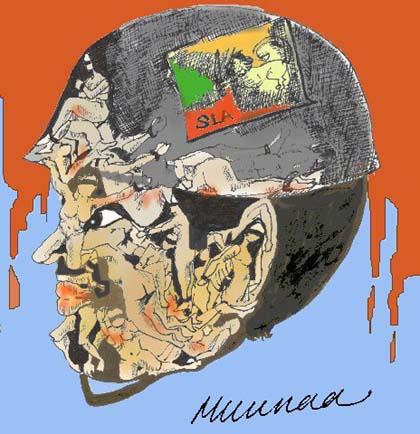 |
How does a citizenry respond when their president, his family (also the core of their government), their opposition leader and leaders of their armed forces stand accused of committing war crimes against their fellow citizens and there is damning evidence to substantiate the claim? Anger, disgust, embarrassment? Maybe even a protest? Or a complete absence of comment…
This past week has no doubt been a difficult one for the Sinhala nation. Not only was their President snubbed on the international stage, having had his invitation to address the Oxford Union revoked, but following the emergence via Wikileaks of a cable from the US ambassador in Colombo stating that the ‘responsibility for many of the alleged crimes rests with the country’s senior civilian and military leadership’ and a deeply disturbing video, the issue of war crimes has been catapulted beyond the realm of accusations and allegations.
Of course the revelations come as little surprise to many involved in Sri Lanka's question, but they have caused a stir in media networks around the world. Journalists, human rights activists and ordinary people have expressed anger and outrage at the callous images. The video captures the brutal murders of blind-folded, beaten men and the degradation of sexually abused and murdered women, by Sri Lankan Army (SLA)soldiers in such graphic detail, that it has been widely accepted as irrefutable evidence of war crimes. Moreover, there is a growing understanding that this latest video is merely the tip of a macabre iceberg.
The world gasps, horrified. But what of the Sinhala nation, how did they respond to this week's revelations? An outcry? A protest? A demand for an inquiry? Yes, yes and yes; not over the war crimes, however, but the president's public humiliation.
Sri Lankan newspapers have devoted column after column, for a minute by minute retrospective commentary, analysis and criticism of the president’s ill-fated visit. The President and his entourage were warmly welcomed home at the airport and blessed for their bravery and strength in face of adversity. An opposition MP has been assaulted, the Tamil diaspora demonized and foreign ministry officials have become targets of a witch-hunt. A vengeful crowd laid siege to the British High Commission, echoing the suspicion in a leading newspaper’s editorial of the UK’s hidden hand. The feeling of anger against Britain runs so high that junior minister Alistair Burt has reportedly postponed his visit to Sri Lanka, possibly indefinitely.
Any mention of the US cable, meanwhile, is only preamble for an attack on the track record of Britain and the USA, in terms of human rights abuses in Iraq and Afghanistan. The Sri Lanka army video, meanwhile, is simply repeatedly dismissed as a fake.
The actions of a tyrannical regime can be ceased, but the informed silence of a nation who repeatedly elect such regimes to power is truly dangerous.
